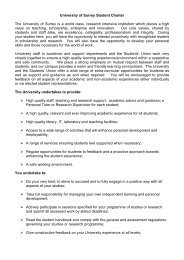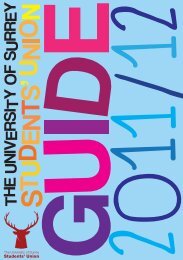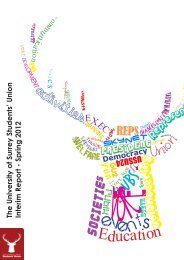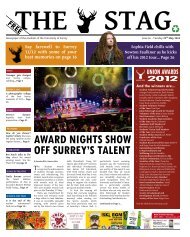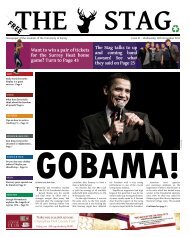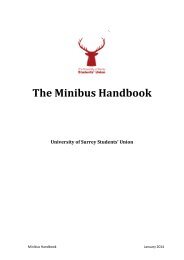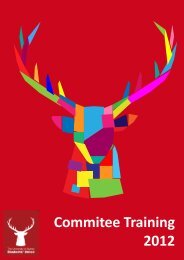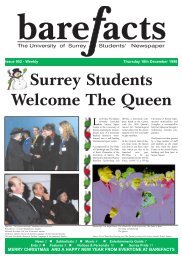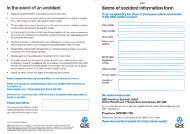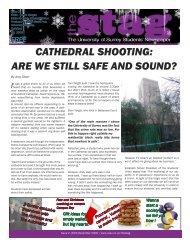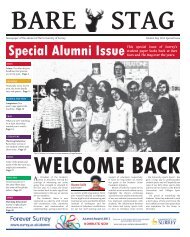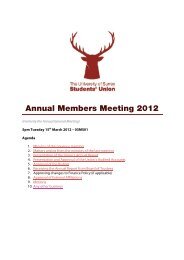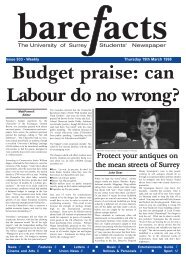asg section f - examinations and other forms of assessment
asg section f - examinations and other forms of assessment
asg section f - examinations and other forms of assessment
You also want an ePaper? Increase the reach of your titles
YUMPU automatically turns print PDFs into web optimized ePapers that Google loves.
50-59 • Demonstrates an adequate breadth <strong>and</strong> depth <strong>of</strong><br />
substantive knowledge but with only a few errors<br />
or omissions<br />
• Demonstrates an adequate underst<strong>and</strong>ing <strong>of</strong> a<br />
range <strong>of</strong> appropriate principles, theories, evidence<br />
<strong>and</strong> techniques<br />
• Shows some ability to critically engage with the<br />
material<br />
40-49 • Incomplete breadth <strong>and</strong> depth <strong>of</strong> substantive<br />
knowledge with some errors or omissions<br />
• Demonstrates an awareness <strong>of</strong> appropriate<br />
principles, theories, evidence <strong>and</strong> techniques<br />
• Limited <strong>and</strong> underdeveloped critical engagement<br />
with the material<br />
30-39 • Little relevant knowledge, which is minimal in its<br />
breadth <strong>and</strong> depth with major errors or omissions<br />
• Minimal awareness <strong>of</strong> appropriate principles,<br />
theories, evidence <strong>and</strong> techniques<br />
• Fails to demonstrate sufficient critical engagement<br />
with the material<br />
20-29 • Does not demonstrate even a basic underst<strong>and</strong>ing<br />
<strong>of</strong> the subject matter<br />
• Insufficient awareness <strong>of</strong> appropriate principles,<br />
theories, evidence <strong>and</strong> techniques<br />
• Little evidence <strong>of</strong> critical engagement with the<br />
material<br />
10-19 • Demonstrates confusion over the subject matter<br />
• Little awareness <strong>of</strong> appropriate principles,<br />
theories, evidence <strong>and</strong> techniques<br />
• No evidence <strong>of</strong> critical engagement with the<br />
material<br />
• Adequate application <strong>of</strong> theoretical<br />
<strong>and</strong> technical knowledge to achieve<br />
learning outcomes although with<br />
some obvious flaws<br />
• Presentation which adequately<br />
reflects relevant pr<strong>of</strong>essional norms<br />
• Demonstrates limited ability to put<br />
theory into practice<br />
• Demonstrates limited technical ability<br />
but lacking theoretical <strong>and</strong> reflective<br />
insights<br />
• Presentation with reflects<br />
pr<strong>of</strong>essional practice in a limited<br />
manner<br />
• Demonstrates a minimal ability to<br />
meet learning outcomes in the grasp<br />
<strong>of</strong> both theory <strong>and</strong> technical<br />
knowledge<br />
• Presentation which displays little<br />
more than cursory attention to<br />
pr<strong>of</strong>essional norms<br />
• Lacks any real application <strong>of</strong> skills to<br />
meet learning outcomes<br />
• Fails to demonstrate any substantive<br />
meeting <strong>of</strong> learning outcomes<br />
• No real attention to the disciplinary<br />
norms <strong>of</strong> presentation<br />
• Fails to demonstrate the use <strong>of</strong> skills<br />
to meet learning outcomes<br />
• Fails to demonstrate any substantive<br />
meeting <strong>of</strong> learning outcomes<br />
• No real attention to the disciplinary<br />
norms <strong>of</strong> presentation<br />
Work that accurately reports on current thinking in the discipline through:<br />
• The repetition <strong>of</strong>, rather than critical engagement with, limited<br />
sources;<br />
• Adequate differentiation between the quality <strong>and</strong> appropriateness <strong>of</strong><br />
sources used;<br />
• Drawing adequate conclusions which do not always fully reflect the<br />
complexity <strong>of</strong> the subject matter;<br />
• An adequate if unsophisticated analytical model.<br />
Work that <strong>of</strong>fers a limited underst<strong>and</strong>ing <strong>of</strong> thinking in the discipline<br />
through:<br />
• Limited attention paid to the quality, range <strong>and</strong> appropriateness <strong>of</strong><br />
sources used;<br />
• Poorly informed opinion led work which lacks a clear evidence base;<br />
• A limited <strong>and</strong> underdeveloped structure <strong>of</strong> argument;<br />
• Work that is <strong>of</strong> limited coherence <strong>and</strong> clarity.<br />
Work that <strong>of</strong>ten misrepresents or misunderst<strong>and</strong>s thinking in the discipline<br />
through:<br />
• Minimal attention paid to the quality, range <strong>and</strong> appropriateness <strong>of</strong><br />
sources used;<br />
• Poorly informed opinion led work with a minimal evidence base;<br />
• No real underlying structure <strong>of</strong> argument;<br />
• Work that is frequently confused <strong>and</strong> incoherent.<br />
Work that fundamentally misrepresents or misunderst<strong>and</strong>s thinking in the<br />
discipline through:<br />
• A lack <strong>of</strong> attention to the quality, range <strong>and</strong> appropriateness <strong>of</strong><br />
sources used;<br />
• Poorly informed opinion-led work rather than evidence based<br />
argument;<br />
• No real underlying structure <strong>of</strong> argument;<br />
Work that completely misrepresents or misunderst<strong>and</strong>s thinking in the<br />
discipline through:<br />
• Inadequacy <strong>of</strong> sources used;<br />
• Unsubstantiated assertion with no evidence base<br />
• Failure to structure the argument being presented;<br />
21



